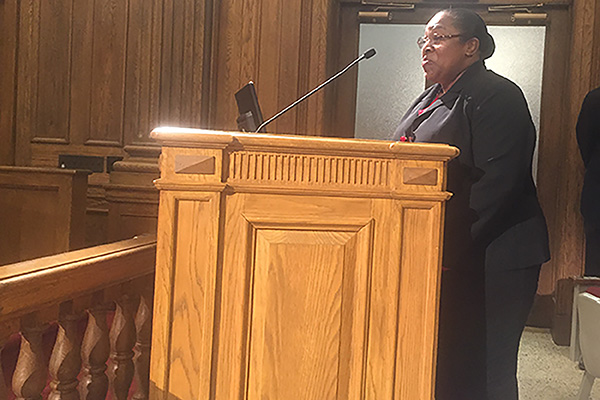People have all sorts of New Year’s resolutions for 2019 but the main resolution of brand new Minority and Business Women Enterprise (MWBE) Director Cynthia Barnes-Phipps is to have Guilford County spend more money with woman and minority owned businesses.
Guilford County recently hired Barnes-Phipps to head up a newly formed independent one-person department meant to boost the percentage of county dollars spent with minority and woman owned businesses.
Barnes-Phipps, who previously headed up MWBE efforts for UNCG said she’s now been through orientation for new county employees, knows where her office is and is ready to tackle the objective.
Barnes-Phipps’ selection was made following a search after the position was created by the Guilford County Board of Commissioners in the 2018-2019 budget.
“I’m diving into the reports,” she said. “The first thing you have to do is an assessment and analysis of where the system is. The other piece is getting with all of the stakeholders.”
As for where Guilford County is right now – well, it’s not doing well at all when it comes to contracting with MWBE businesses. In fact, basically, there’s only one way to go – up. Throughout 2018, the three black commissioners – Skip Alston, Carolyn Coleman and Carlvena Foster –repeatedly pointed out that the county has a dismal MWBE record.
The Guilford County Board of Commissioners unanimously approved the creation of the new MWBE position for Guilford County government in June after Alston and Coleman argued that the county needed a director who would focus entirely on increasing the number of minority- and women-owned enterprises that do business with Guilford County. That addition of a new county MWBE director position was one of the main reasons there was a unanimous vote for that $600-million-plus budget.
Alston said this week that he’s very high on Barnes-Phipps and her ability to turn things around. He said she was the “best person out there” for the county’s newly created position.
This week Barnes-Phipps said one key element of her strategy will be conducting much more outreach to minority and women-owned businesses. She said that at UNCG one of the challenges was making target companies aware of the available work.
“Contractors were not familiar with the opportunities,” she said. “That was probably the biggest hurdle.”
She added that there would be more “direct solicitation” to minority owned companies in an effort to “help them get their foot in the door.”
Guilford County, like UNCG, must select the lowest responsible bidder on large projects; a public university or a county can’t just say it’s going to hire more minority firms and then do so. But Barnes-Phipps said there are strategies to help those companies be more competitive when submitting bids to the county.
Barnes-Phipps also said she’s very familiar with other people and agencies in the state who can help Guilford County achieve its goal.
“I do have relationships already at the state level and I’ve maintained those relationships,” she said, adding that they will be real “assets” in her effort.
At UNCG, she had the title “facility engineering specialist, historically underutilized business (HUB) coordinator,” and she won the 2016 MWBE Advocate Award, which was given in recognition of her dedication to and success in promoting and minority and women-owned businesses.
A graduate of North Carolina A&T University, Barnes-Phipps worked at UNCG for over two decades.


So her job is to discriminate against white men who own businesses.
MWBE = White Men need not apply. Racism AND sexism!
Where’s the outrage from Liberal Social Justice Warriors ? Or are they just fine so long as it’s white guys who are getting the shaft?